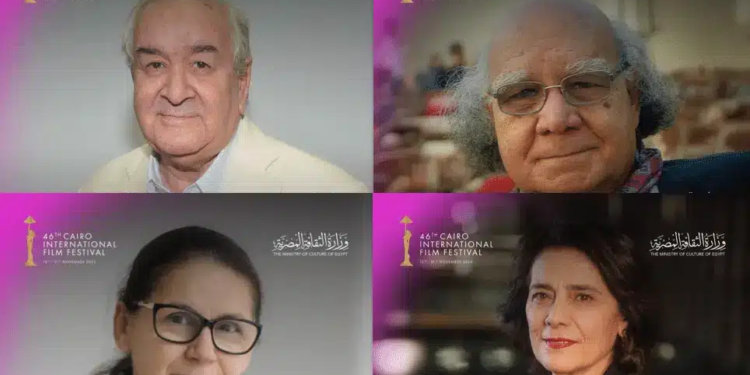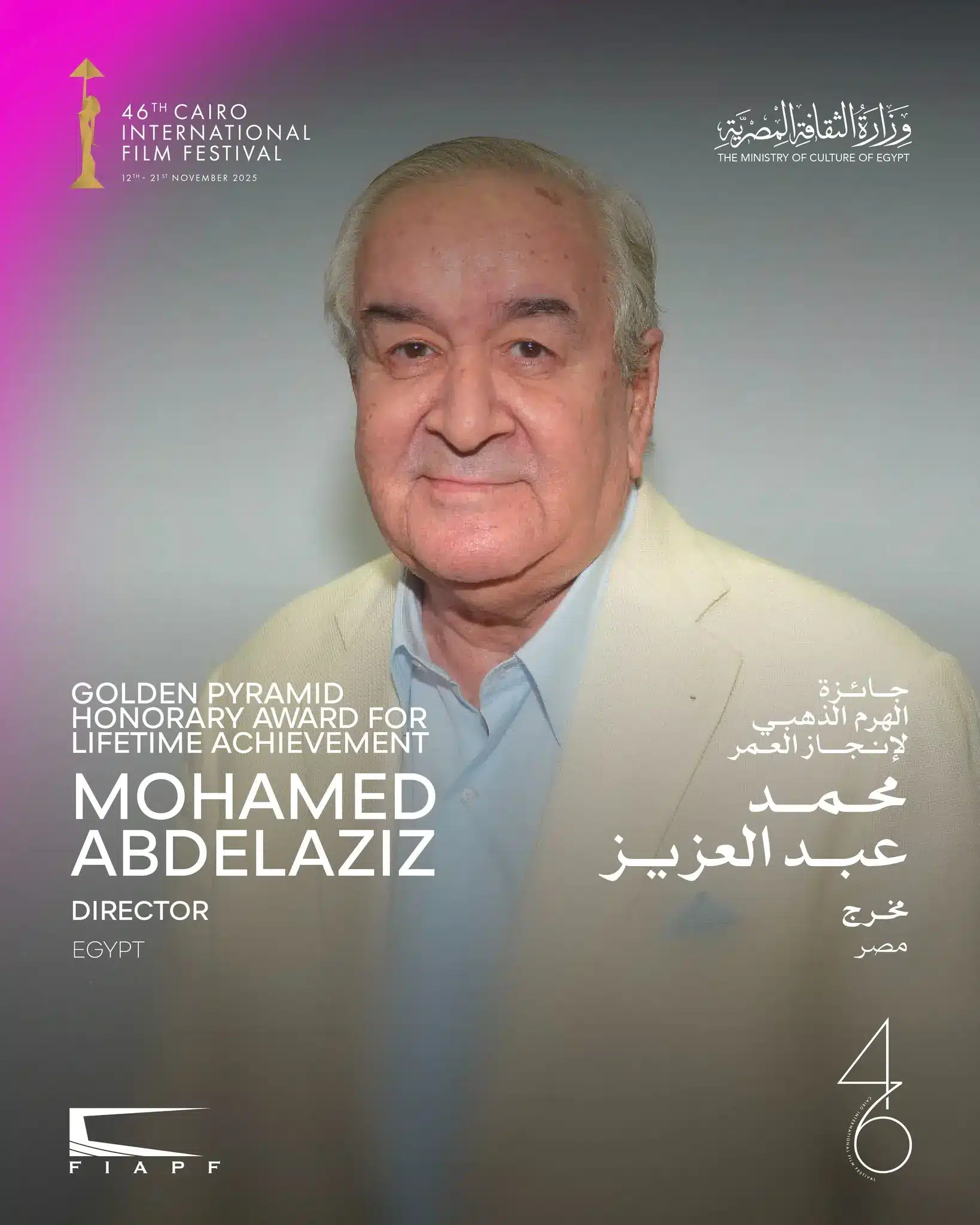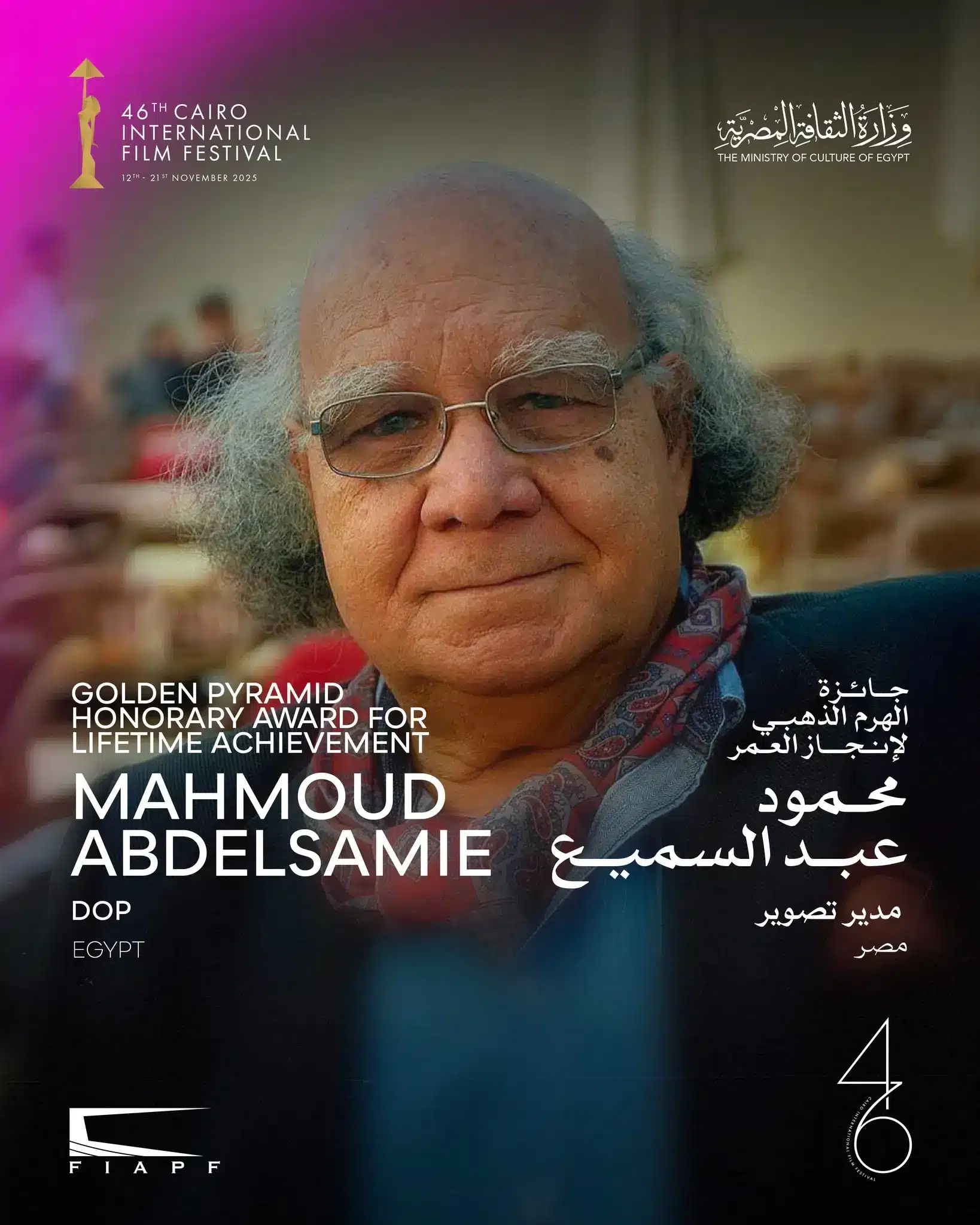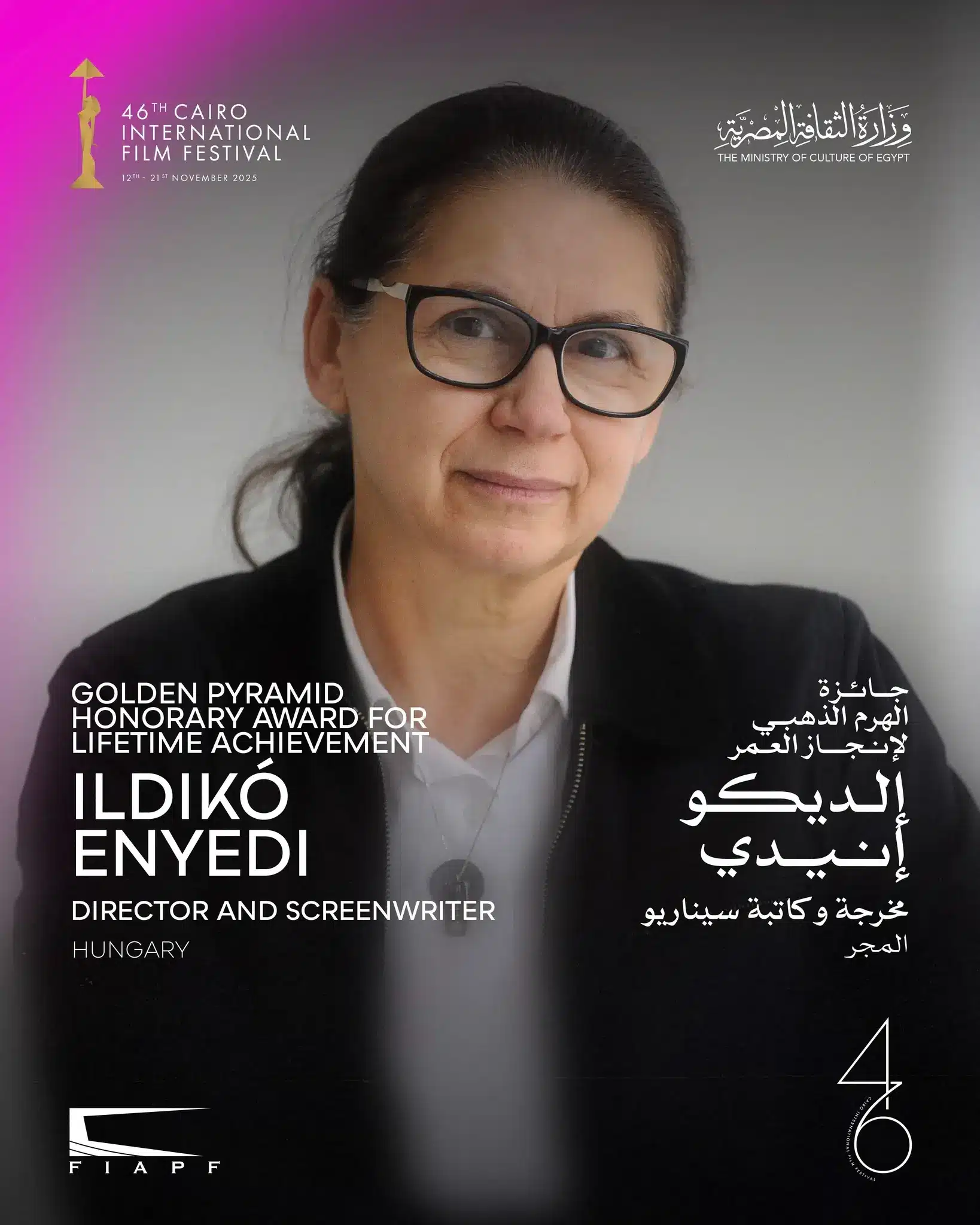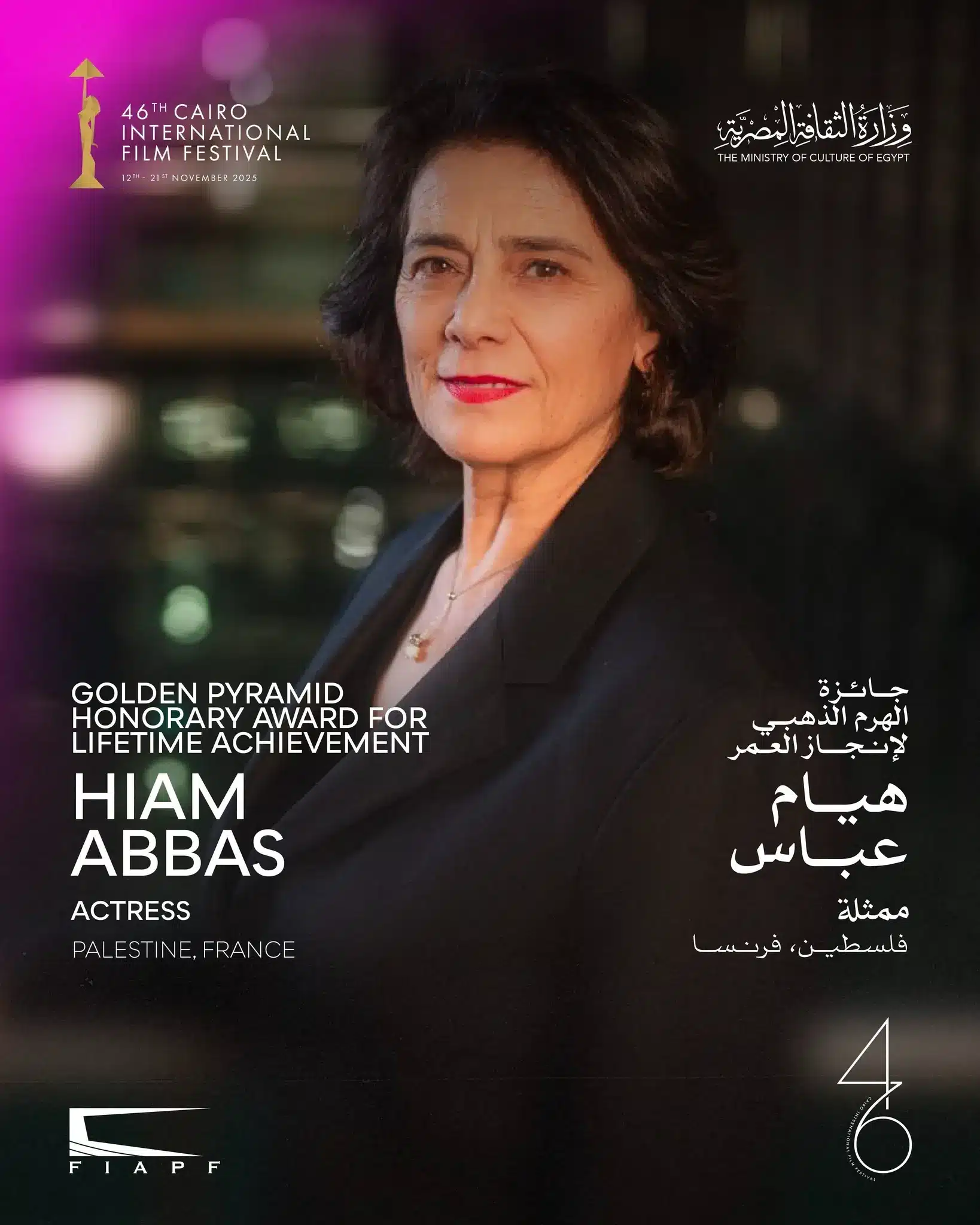As it marks its 46th edition, taking place from November 12 to 21, 2025, the Cairo International Film Festival (CIFF) will honor four remarkable figures of Egyptian, Arab, and international cinema with its Golden Pyramid for Lifetime Achievement (Career Achievement Award). This year’s recipients — Mohamed Abdel Aziz, Mahmoud Abdel Samie, Ildikó Enyedi, and Hiam Abbass — are celebrated for their lifelong dedication to film, their artistic legacy, and their influence across generations of filmmakers. Through these tributes, the CIFF reaffirms both its deep roots in Egyptian cinematic heritage and its global vision of cinema as a bridge between cultures.
Mohamed Abdel Aziz: The Architect of Social Comedy
A defining figure of Egyptian cinema since the 1970s, Mohamed Abdel Aziz built a body of work that is both deeply popular and artistically rigorous. Having begun his career as assistant director on landmark productions such as Cairo 30 (1966), My Father Above the Tree (1969), We Do Not Sow Thorns (1970), and Chatter on the Nile (1971), he made his directorial debut with Forbidden Photos (1972), one of the last black-and-white films in Egyptian cinema.
What sets Abdel Aziz apart is his rare ability to combine social realism and humor, capturing the contradictions of everyday life through the light touch of comedy. Films like In Summer, We Must Love (1974), The World of Kids (1976), and Thousand Kisses, and a Kiss (1977) redefined the tone and rhythm of Egyptian comedies. His long collaboration with Adel Imam produced enduring classics such as Some Visit the Marriage Registrar Twice (1978), Watch Out for Your Neighbors (1979), and Hanfi the Pasha (1990).
Often described as the successor to Fatin Abdel Wahab, Abdel Aziz was known for his perfectionism — his colleagues affectionately nicknamed him “the dictator director” for his insistence on precision. Beyond film, he made his mark on stage (Mohamed Ali Street, 1991; Afrotto, 1999) and television (A Day of Honey, A Day of Onions, 1998; Abu Dahka Genan, 2009, a biopic of Ismail Yassine). As a long-time professor at the Higher Institute of Cinema, he passed on his craft to a new generation, embodying a total vision of Egyptian cinema — entertaining, reflective, and enduring.
Mahmoud Abdel Samie: The Eye of Reality
If Mohamed Abdel Aziz represents the art of popular storytelling, Mahmoud Abdel Samie stands as the quiet force behind Egyptian visual history. A cinematographer and documentary filmmaker whose career spans over five decades, he has been shaping the country’s image since earning his degree from the Faculty of Applied Arts in 1966.
Abdel Samie was the first cinematographer to document the frontlines during the War of Attrition in 1969 and the tense months preceding Egypt’s victory in 1973. As part of the New Realism movement, he brought poetic restraint to films such as Houseboat No. 70, The Piper, A Love Story’s Last Chapter, and The Hooligans. His lens captures the rhythms of daily life with a clarity that transcends rhetoric.
Now president of the Cairo Film Society and its annual festival, Abdel Samie continues to mentor young cinematographers and filmmakers. By honoring him with a Career Achievement Award, the CIFF celebrates both the witness and the creator, a man who turned documentary filmmaking into an art form equal in depth and dignity to fiction.
Ildikó Enyedi: The Elegance of Mystery and Emotion
On the international front, the festival honors Hungarian filmmaker Ildikó Enyedi, whose poetic and intellectually rich cinema has captivated audiences for decades. Her debut feature, My Twentieth Century, won the Caméra d’Or at Cannes, announcing the arrival of a singular voice fascinated by memory, identity, and the elusive beauty of human experience.
In 2017, On Body and Soul won the Golden Bear in Berlin and went on to be nominated for an Academy Award for Best International Feature. From Simon, the Magician to The Story of My Wife, her work blurs the lines between dream and reality, intellect and intimacy. Her latest film, Silent Friend, which premiered at the Venice Biennale in September, will screen at CIFF out of competition — continuing her exploration of the delicate interplay between the mind and the senses.
A former film professor in Budapest and frequent festival juror, including Cannes, Enyedi represents the rare filmmaker who fuses thought and emotion in perfect harmony. Her Career Achievement Award from CIFF recognizes not just a career, but a unique vision of cinema as a form of human tenderness and philosophical wonder.
Hiam Abbass: The Living Memory of Arab Cinema
The CIFF also pays tribute to Hiam Abbass, the Palestinian actress, writer, and director whose career embodies dialogue between Arab and Western cultures. Born in Nazareth in 1960 and trained in photography and theater in Jerusalem, she moved to Paris in the late 1980s and has since appeared in more than a hundred films and series, known for her dignified, magnetic presence.
In the Arab world, she has starred in Haifa by Rashid Masharawi, Gate of the Sun by Yousry Nasrallah, and Paradise Now by Hany Abu-Assad. Internationally, she has worked with Steven Spielberg (Munich), Tom McCarthy (The Visitor), and Ridley Scott (Blade Runner 2049). On television, her roles in Succession and Ramy have earned acclaim for their depth and authenticity, redefining Arab representation on screen.
Abbass is also a filmmaker in her own right. Her feature debut Inheritance (2012) reflects on transmission, memory, and identity — recurring themes in her body of work. In celebrating her, CIFF salutes not just a performer, but a storyteller who builds bridges, challenges stereotypes, and embodies a profound sense of universality rooted in Arab experience.
A Constellation of Voices
By honoring these four artists, the Cairo International Film Festival brings together the many faces of cinema — popular and poetic, local and universal. They all share a belief in film’s enduring power to reflect, challenge, and transform the world.
The Career Achievement Awards at CIFF 2025 are not merely lifetime honors. They form a collective portrait of cinema as a living memory — one that spans continents, generations, and sensibilities. From Cairo to Budapest, from Nazareth to Paris, these honorees remind us that cinema, in all its languages, remains a shared act of vision and humanity.
Neïla Driss


